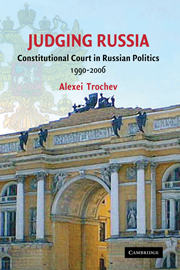Book contents
- Frontmatter
- Contents
- List of Figures and Tables
- Acknowledgments
- Abbreviations
- Notes on Transliteration
- 1 Introduction: Three Puzzles of Postcommunist Judicial Empowerment
- 2 Nonlinear Judicial Empowerment
- 3 Making and Remaking Constitutional Review, Russian-Style
- 4 Russian Constitutional Review in Action (1990–1993)
- 5 Decision Making of the 2nd Russian Constitutional Court: 1995–2006
- 6 The Constitutional Court Has Ruled – What Next?
- 7 The 2nd Russian Constitutional Court (1995–2007): Problematique of Implementation
- 8 “Tinkering with Judicial Tenure” and “Wars of Courts” in Comparative Perspective
- 9 Conclusion: Zigzagging Judicial Power
- Appendix
- Bibliography
- Statutes and Decrees
- Court Decisions
- Index
9 - Conclusion: Zigzagging Judicial Power
Published online by Cambridge University Press: 25 July 2009
- Frontmatter
- Contents
- List of Figures and Tables
- Acknowledgments
- Abbreviations
- Notes on Transliteration
- 1 Introduction: Three Puzzles of Postcommunist Judicial Empowerment
- 2 Nonlinear Judicial Empowerment
- 3 Making and Remaking Constitutional Review, Russian-Style
- 4 Russian Constitutional Review in Action (1990–1993)
- 5 Decision Making of the 2nd Russian Constitutional Court: 1995–2006
- 6 The Constitutional Court Has Ruled – What Next?
- 7 The 2nd Russian Constitutional Court (1995–2007): Problematique of Implementation
- 8 “Tinkering with Judicial Tenure” and “Wars of Courts” in Comparative Perspective
- 9 Conclusion: Zigzagging Judicial Power
- Appendix
- Bibliography
- Statutes and Decrees
- Court Decisions
- Index
Summary
This study of the 16-year-old Russian Constitutional Court provides several insights for scholarship on the “black box” of judicial empowerment. Although these insights, learned from a three-case study within one state, may not travel successfully across other times and places, this learning may provide a context for future systematic comparisons and may illuminate the puzzles to be addressed in future research. Understanding the turbulent emergence of Russian constitutionalism and judicial review in the post-Soviet era informed us about several puzzles of judicial empowerment:
why the same powerful political actors who created the judicial review tribunal in 1991 nearly disbanded it after 2 years of its operation, and then revived the court shortly thereafter;
why the RCC exercised its judicial powers broadly yet inconsistently; and
why government officials, including judges on other courts, promptly carried out RCC decisions in some cases, delayed implementation in other cases, and sometimes simply ignored RCC orders.
My short answer to all three puzzles is that a mix of domestic and international legal, political, and psychological factors accounts for this zigzag behavior on the part of politicians, judges, and bureaucrats. Those who pay attention to judicial review (politicians, judges, bureaucrats, and legal elites) can attempt to influence the impact of the constitutional courts by changing the design of these courts, their jurisprudence, and levels of compliance with their judgments. This may generate the following nonlinear trajectories of judicial empowerment.
- Type
- Chapter
- Information
- Judging RussiaThe Role of the Constitutional Court in Russian Politics 1990–2006, pp. 285 - 304Publisher: Cambridge University PressPrint publication year: 2008



